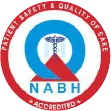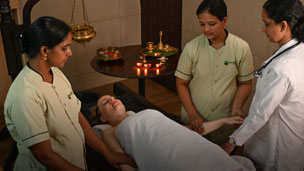







For authentic & scientific
ayurveda
Nagarjuna has developed speciality protocols
and adopted integrated and holistic approaches “to improve
the quality of life of ailing population”.
Frozen Shoulder
Frozen shoulder, also known as adhesive capsulitis, is a condition characterized by stiffness, pain, and limited range of motion in the shoulder joint. It typically develops gradually and progresses through three stages: freezing, frozen, and thawing.
The exact cause of the frozen shoulder is not fully understood, but it is believed to involve inflammation and thickening of the capsule surrounding the shoulder joint. Several factors can contribute to the development of frozen shoulder. People with certain medical conditions, such as diabetes, are at a higher risk of developing the condition. The reason for the association between diabetes and frozen shoulder is not completely clear, but it is thought to be related to the effects of high blood sugar on connective tissues and the joint capsule.
Additionally, individuals who have experienced prolonged immobilization or limited use of their arm due to factors such as injury, surgery, or sedentary lifestyle are more susceptible to developing frozen shoulder. In these cases, the lack of movement and stretching of the shoulder joint can lead to the formation of adhesions and scar tissue, which further restricts shoulder mobility.
The symptoms of frozen shoulder typically start with pain and gradually progress to stiffness and limited range of motion. The condition typically goes through three distinct stages:
- Freezing stage: This is the initial stage, characterized by the onset of shoulder pain that worsens over time. The pain may be present both at rest and with movement, and it can significantly limit the range of motion of the shoulder.
- Frozen stage: In this stage, the shoulder stiffness becomes more pronounced, and the pain may decrease or become more localized. The range of motion becomes severely limited, making it difficult to perform everyday activities that involve shoulder movements.
- Thawing stage: During this stage, the shoulder gradually begins to regain its range of motion and function. The pain and stiffness start to subside, and most individuals experience a gradual improvement in shoulder mobility over time. This stage can last several months to years.
The treatment of frozen shoulder aims to relieve pain, reduce stiffness, and restore shoulder function. It usually involves a combination of conservative measures and physical therapy. Nonsteroidal anti-inflammatory drugs (NSAIDs), corticosteroid injections, and pain management techniques may be used to alleviate pain and inflammation. Physical therapy plays a crucial role in improving shoulder mobility through gentle stretching, range of motion exercises, and strengthening exercises.
In severe cases where conservative measures do not provide sufficient relief, more invasive interventions such as manipulation under anesthesia or arthroscopic surgery may be considered to break up adhesions and scar tissue and restore shoulder mobility.
It is important to seek medical attention if you experience persistent shoulder pain and stiffness to receive an accurate diagnosis and appropriate treatment for frozen shoulder. Early intervention and a comprehensive treatment plan can help manage symptoms, prevent further progression, and promote the recovery of shoulder function.
Please fill up the form to get in touch with us, or contact us for any queries





Terms of use | Privacy Policy | Contact us
Copyright © 2026. All Rights Reserved
Designed & Developed by Websoul Techserve








